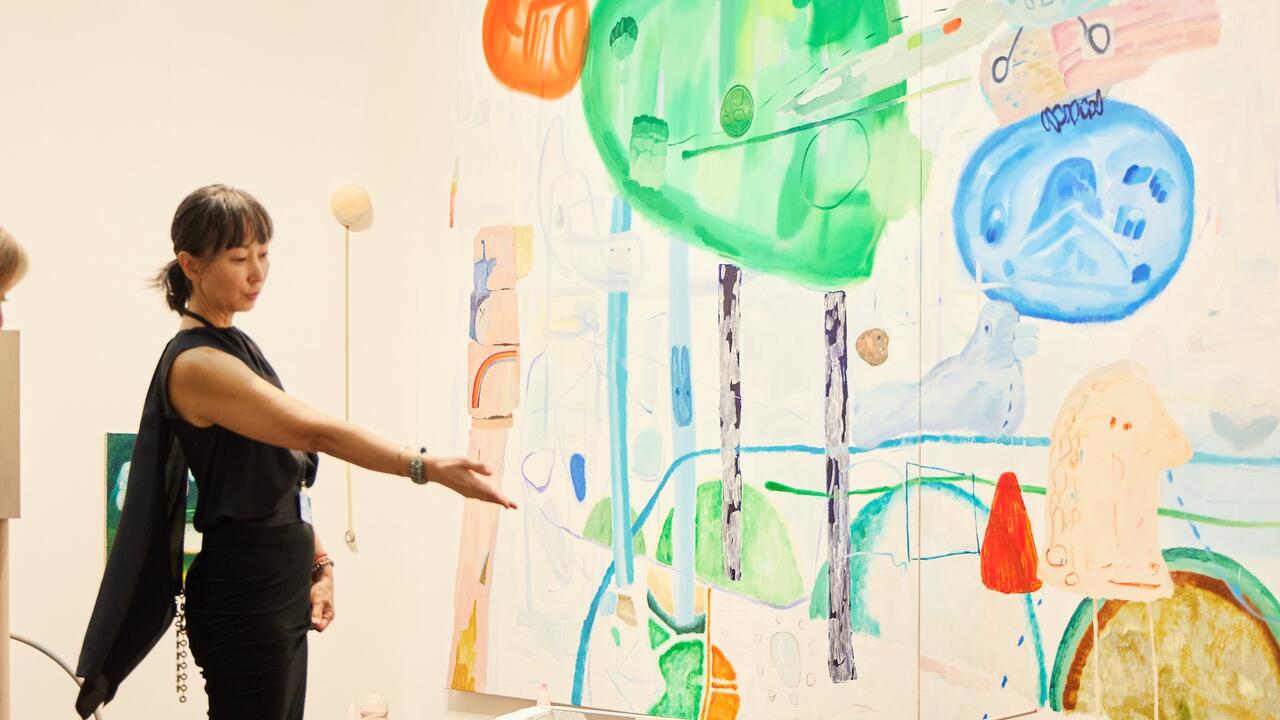Jordan Wolfson

Animation, masks (2011), a 12-minute video by Jordan Wolfson, is not easy viewing. Formally speaking, it deftly handles the relatively unexplored territory of animation in contemporary art, and if its subject matter weren’t so disquieting it could be more simply read as a technical study. Its content traffics in ethnic stereotyping, narcissism, class disparity and implied violence with a debatable ambivalence. In many ways, it is downright creepy – it slithers under your skin and scratches at your conscience. For these reasons, Animation, masks is a notable piece of work.
In the centre of the screen is an animated caricature of a balding Jewish man, with a large hooked nose, wiry black beard and yarmulke. He occasionally flips through a copy of Vogue. His elastic body moves through various repeated actions: making a gun shape with his fingers to point at us or himself; putting an arm coquettishly behind his head; leering whilst miming being on the telephone; or punching himself in the face. Sometimes his nose extends into a long droopy proboscis; at other moments his ears suddenly inflate. In the background cycles a series of still images, some of which look low-res or are turned on their side, depicting a range of interiors – chic loft spaces, messy working-class homes, suburban kitchens, grotty teenage bedrooms. For added contextual complication, the video – which was co-produced with Johann König in Berlin – was screened on a disgustingly big widescreen television in the middle of a royal-blue carpeted room.
The soundtrack really makes things awkward. First, there’s a scripted conversation between a man and a woman, the man asking her to ‘tell them what it’s like to be with me’. The cartoon protagonist mimes both sides of the conversation, which involves topics such as how playful the male speaker is in bed and the size of his penis. Then the figure ventriloquizes a recording of Richard Brautigan’s ‘Love Poem’ (1967). First we hear Brautigan reciting the short poem – ‘It’s so nice to wake up in the morning all alone and not have to tell somebody you love them when you don’t love them anymore’ – followed by the writer’s friends giving their versions, which tease out a variety of moods from the short verse. The video ends with a slow zoom as the cartoon character looks directly at us with a knowing smirk, to the accompaniment of Charles Trenet singing ‘La Mer’ (The Sea, 1946).
His physical gestures play out with no apparent connection to the soundtrack, which creates disturbing contrasts between what you see and hear – for instance, a tender conversation about sexual intimacy is matched with the figure leering and miming a gun. This is ramped up when Wolfson brings into play various ‘mask’ features, superimposing onto the contours of the character’s face a range of images including a cartoon bomb, an apple, blackface, Bart Simpson, Charlie Brown and the Compact Disc trademark.
The work’s aesthetic, which contrasts polished 3D modelled animation with pixellated imagery, rubs Pixar against Google Image search. Wolfson’s video demonstrates that animation can represent a great deal that live-action cinematography can’t, but it constitutes a field of image-making that is only just beginning to find some play in art discourse. Despite the work’s zippy digital chops, I couldn’t help but be reminded of Ralph Bakshi’s extraordinary 1973 film Heavy Traffic, which combined documentary photographs of run-down ’70s New York with grotesquely caricatured cartoon figures in a satire of inner-city sex, violence and racism. In also trying to express something about the urban environment and personal identity, Wolfson’s video headbutts its way into a complex matrix of representation: men speaking about women, middle-class artists speaking about upper-income or working-class living environments, Jewish artists (i.e. Wolfson) using ethnic caricatures to speak about all of the above. Add into the mix love and desire, being solitary or together with someone, and Animation, masks becomes a thick stew of issues.
When I asked Wolfson about the work, he said: ‘The character is a caricature, implicitly a cartoon. In the end, I feel it’s not a Jewish art work, but an art work that uses the Jew as one of many elements. The work is really about animation and what animation has the possibility to contain, which leads into a conversation about distortion.’ And questions of distortions – of where we’re speaking from, of what we’re really doing when we’re speaking, of how to speak with honesty and openness, and what extra permissions satire might give us – seem to me what Animation, masks is trying to ask.

















